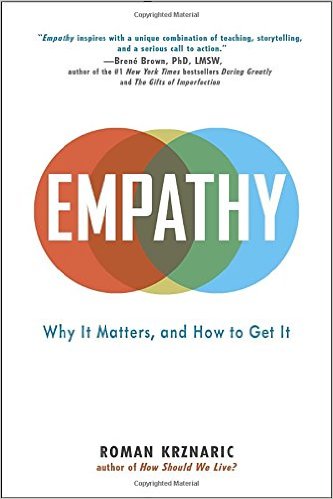Empathy, according to cultural thinker Roman Krznaric, is “an ideal that has the power both to transform our own lives and to bring about fundamental social change. Empathy can create a revolution.” And the good news is that, unless you fall into the 2 percent of the general population who completely lack empathy (i.e., psychopaths), it’s a skill that you can cultivate and deepen.
So what is empathy? In his most recent book, Empathy: Why It Matters, and How to Get It, Krznaric starts by explaining what it’s not. It’s not sympathy, which connotes pity, nor is it merely compassion, which means sharing in another’s suffering. (The Buddhist notion of compassion, Krznaric notes, is more actively empathic, but he advises against using these two terms as synonyms.) It’s also not the Golden Rule. He argues that to be truly empathic, we need to go beyond the Golden Rule and practice the Platinum Rule: “Do unto others as they would have you do unto them.” Empathy is the ability to step imaginatively into others’ shoes, understand their feelings and aspirations, see things from their point of view, and use that understanding to guide our actions.
It can be hard work.
The bulk of the book describes six habits that highly empathic people cultivate, including making a conscious effort to recognize other people’s humanity and perspectives, seeking experiential adventures that immerse you in lives and cultures different from your own, fostering curiosity about others, dropping your guard and taking off your “mask” when interacting with them, and truly listening. Krznaric says that we must also “extend our empathy beyond the usual suspects … and be more adventurous in our efforts to step into other people’s shoes.” This means trying our best to empathize with those whom we consider to be our “enemies”—whether that is an estranged family member or someone who was involved in a violent conflict. While I was reading this book, I kept imagining trying to empathize with someone like Walter Palmer—as I said above, empathy isn’t always easy.
Krznaric also gives many examples of brave people from history who have put their empathy into action—from Oskar Schindler, the one-time Nazi sympathizer who famously became one of the most revered Holocaust rescuers, and product designer Patricia Moore, who disguised herself under layers of latex to experience the world as an elderly person and was instrumental in the passage of the Americans With Disabilities Act, to Arab Spring and Occupy protesters and investigative journalists who’ve gone undercover to expose racism and the exploitation of immigrant workers.
One place where we won’t find much empathy, Krznaric argues, is online. He believes that truly empathic interactions must happen face to face, while social media tends to foster superficial connections. And while there’s a place for armchair activism, such as signing online petitions, he believes that we shouldn’t be lulled into equating such activities with authentic political action. As the huge turnout during the California Coastal Commission’s hearing on SeaWorld‘s proposed Blue World Project proves, showing up in person is still vitally important.
Krznaric spends a scant few pages discussing extending our empathy to other species, but he does acknowledge the need for an “attitudinal shift … so that the idea of cross-species empathy becomes an accepted cultural norm.” That said, anyone working in any social justice movement, including the animal rights movement, would surely benefit from practicing the habits described in these pages. “If we aspire for empathy to fulfill its revolutionary potential as a force for social change, we must generate a deep cultural shift so that looking at the world through other people’s eyes becomes as common as looking both ways when we cross the road. This shift is already under way,” he writes. “But there is so much more we can do to expand its reach.”
PETA is a participant in the Amazon Services LLC Associates Program, an affiliate advertising program designed to provide a means for sites to earn advertising fees by advertising and linking to Amazon.com.






